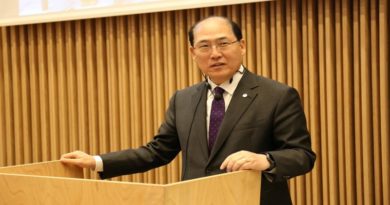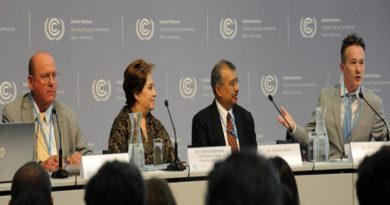IPCC Report: Experts complete First Order Draft, start Third Lead Author Meeting
Nearly 500 experts from around the world took part in the recent review of the First Order Draft of the Intergovernmental Panel on Climate Change (IPCC) Special Report on Global Warming of 1.5 °C (SR15). At a meeting in Malmö, Sweden, this week, the authors will work on addressing nearly 13,000 comments from expert reviewers in 61 countries as they prepare the Second Order Draft.
The Third Lead Author Meeting for the Special Report on Global Warming of 1.5°C is being held in Malmð at the kind invitation of the Swedish government. The meeting is being hosted by the Swedish Meteorological and Hydrological Institute (SMHI) and taking place at MalmõMässan from 23-27 October 2017
This week’s meeting marks the culmination of the first round of expert review of the draft report: Global Warming of 1.5 °C: an IPCC special report on the impacts of global warming of 1.5 °C above pre-industrial levels and related global greenhouse gas emission pathways, in the context of strengthening the global response to the threat of climate change, sustainable development, and efforts to eradicate poverty.
Key statistics
Two thousand experts from 124 different countries registered to be reviewers (based on citizenship)
Overall, the First Order Draft of the Special Report on 1.5 °C attracted 12,895 review comments.
These comments came from 489 expert reviewers representing 61 different countries.
Based on citizenship, half of expert reviewers were from Europe (51%). North America, Central America and the Caribbean accounted for a further 19%, Asia (13%), South America (7%), South West Pacific (6%) and Africa (5%).
A third (31%) of expert reviewers were female, two thirds (69%) were male.
Three quarters of reviewers (77%) were citizens of developed countries, 23% of developing countries.
Chapter 3 on impacts of 1.5 °C global warming on natural and human systems attracted the most review comments (3,894, 30% of total comments). See full breakdown below.
All IPCC reports go through two stages of formal review. Feedback received in the first round of expert review will be incorporated, as appropriate, by the authors into the Second Order Draft. The Second Order Draft will then be open for review by governments and experts around the world from 8 January to 25 February 2018. The final report is due to be finalised and made publicly available in October 2018.
“The Second Order Draft will include a first version of the Summary for Policymakers (SPM), which is a distillation of the most policy-relevant findings from each chapter. Governments have asked us for a very concise SPM this time (about 10 pages),” said Valérie Masson-Delmotte, WGI Co-Chair.
The IPCC’s comprehensive review process ensures that the reports cover the most up-to-date scientific, technical and socio-economic findings, and are representative of a broad range of independent expertise from developed and developing countries.
“An indicator of success for the IPCC process is the involvement of the scientists worldwide. Having about five times more expert reviewers than authors and nearly 13,000 comments is crucial. There is not a single section, table or figure that did not receive any comments,” said Masson-Delmotte.
Of the 86 experts from 39 countries selected by the members of all three IPCC Working Groups in February to be authors of the Special Report on 1.5 °C, 38% are women, 51% come from developing countries and economies in transition (based on citizenship) and 26% are new to the IPCC process.
The IPCC Special Report on Global Warming of 1.5 °C is being prepared in response to an invitation from the 21st Conference of the Parties (COP21) to the United Nations Framework Convention on Climate Change. The report will be wide-ranging, assessing possible ways for limiting global warming to 1.5 °C, as well as considering these issues in the broader context of sustainable development. More details are available on the report page.
The Special Report on Global Warming of 1.5 °C is part of the IPCC’s sixth assessment cycle. This cycle will produce three Special Reports, a Methodology Report on national greenhouse gas inventories and the Sixth Assessment Report (AR6), consisting of contributions from Working Groups I, II and III and a Synthesis Report.




